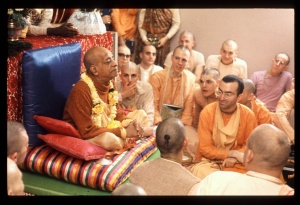CC Madhya 24.137: Difference between revisions
m (1 revision(s)) |
No edit summary |
||
| Line 1: | Line 1: | ||
{{ | [[Category:Sri Caitanya-caritamrta - Madhya-lila Chapter 24|C137]] | ||
<div style="float:left">'''[[Sri Caitanya-caritamrta|Śrī Caitanya-caritāmṛta]] - [[CC Madhya|Madhya-līlā]] - [[CC Madhya 24|Chapter 24: The Sixty-One Explanations of the Atmārāma Verse]]'''</div> | |||
<div style="float:right">[[File:Go-previous.png|link=CC Madhya 24.136|Madhya-līlā 24.136]] '''[[CC Madhya 24.136|Madhya-līlā 24.136]] - [[CC Madhya 24.138|Madhya-līlā 24.138]]''' [[File:Go-next.png|link=CC Madhya 24.138|Madhya-līlā 24.138]]</div> | |||
{{CompareVersions|CC|Madhya 24.137|CC 1975|CC 1996}} | |||
{{RandomImage}} | |||
==== TEXT 137 ==== | ==== TEXT 137 ==== | ||
<div | <div class="verse"> | ||
bhayaṁ dvitīyābhiniveśataḥ syād | :bhayaṁ dvitīyābhiniveśataḥ syād | ||
īśād apetasya viparyayo | :īśād apetasya viparyayo 'smṛtiḥ | ||
tan-māyayāto budha ābhajet taṁ | :tan-māyayāto budha ābhajet taṁ | ||
bhaktyaikayeśaṁ guru-devatātmā | :bhaktyaikayeśaṁ guru-devatātmā | ||
</div> | </div> | ||
| Line 14: | Line 18: | ||
==== SYNONYMS ==== | ==== SYNONYMS ==== | ||
<div | <div class="synonyms"> | ||
''bhayam''—fear; ''dvitīya-abhiniveśataḥ''—from the misconception of being a product of material energy; ''syāt''—arises; ''īśāt''—from the Supreme Personality of Godhead, Kṛṣṇa; ''apetasya''—of one who has withdrawn (the conditioned soul); ''viparyayaḥ''—reversal of position; ''asmṛtiḥ''—no conception of his relationship with the Supreme Lord; ''tat-māyayā''—because of the illusory energy of the Supreme Lord; ''ataḥ''—therefore; ''budhaḥ''—one who is wise; ''ābhajet''—must worship; ''tam''—Him; ''bhaktyā''—by devotional service; ''ekayā''—not diverted to ''karma'' and ''jñāna''; ''īśam''—the Supreme Personality of Godhead; ''guru''—as the spiritual master; ''devatā''—worshipable Lord; ''ātmā''—Supersoul. | |||
</div> | </div> | ||
| Line 21: | Line 25: | ||
==== TRANSLATION ==== | ==== TRANSLATION ==== | ||
<div | <div class="translation"> | ||
"'When the living entity is attracted by the material energy, which is separate from Kṛṣṇa, he is overpowered by fear. Because he is separated from the Supreme Personality of Godhead by the material energy, his conception of life is reversed. In other words, instead of being the eternal servant of Kṛṣṇa, he becomes Kṛṣṇa's competitor. This is called viparyayo 'smṛtiḥ. To nullify this mistake, one who is actually learned and advanced worships the Supreme Personality of Godhead as his spiritual master, worshipful Deity and source of life. He thus worships the Lord by the process of unalloyed devotional service.' | |||
</div> | </div> | ||
| Line 28: | Line 32: | ||
==== PURPORT ==== | ==== PURPORT ==== | ||
<div | <div class="purport"> | ||
This verse is quoted from Śrīmad-Bhāgavatam ([[SB 11.2.37]]). | This verse is quoted from [[Srimad-Bhagavatam|''Śrīmad-Bhāgavatam'']] ([[SB 11.2.37]]). | ||
</div> | </div> | ||
__NOTOC__ | |||
<div style="float:right; clear:both;">[[File:Go-previous.png|link=CC Madhya 24.136|Madhya-līlā 24.136]] '''[[CC Madhya 24.136|Madhya-līlā 24.136]] - [[CC Madhya 24.138|Madhya-līlā 24.138]]''' [[File:Go-next.png|link=CC Madhya 24.138|Madhya-līlā 24.138]]</div> | |||
__NOTOC__ | |||
__NOEDITSECTION__ | |||
Revision as of 10:45, 14 September 2021

A.C. Bhaktivedanta Swami Prabhupada
TEXT 137
- bhayaṁ dvitīyābhiniveśataḥ syād
- īśād apetasya viparyayo 'smṛtiḥ
- tan-māyayāto budha ābhajet taṁ
- bhaktyaikayeśaṁ guru-devatātmā
SYNONYMS
bhayam—fear; dvitīya-abhiniveśataḥ—from the misconception of being a product of material energy; syāt—arises; īśāt—from the Supreme Personality of Godhead, Kṛṣṇa; apetasya—of one who has withdrawn (the conditioned soul); viparyayaḥ—reversal of position; asmṛtiḥ—no conception of his relationship with the Supreme Lord; tat-māyayā—because of the illusory energy of the Supreme Lord; ataḥ—therefore; budhaḥ—one who is wise; ābhajet—must worship; tam—Him; bhaktyā—by devotional service; ekayā—not diverted to karma and jñāna; īśam—the Supreme Personality of Godhead; guru—as the spiritual master; devatā—worshipable Lord; ātmā—Supersoul.
TRANSLATION
"'When the living entity is attracted by the material energy, which is separate from Kṛṣṇa, he is overpowered by fear. Because he is separated from the Supreme Personality of Godhead by the material energy, his conception of life is reversed. In other words, instead of being the eternal servant of Kṛṣṇa, he becomes Kṛṣṇa's competitor. This is called viparyayo 'smṛtiḥ. To nullify this mistake, one who is actually learned and advanced worships the Supreme Personality of Godhead as his spiritual master, worshipful Deity and source of life. He thus worships the Lord by the process of unalloyed devotional service.'
PURPORT
This verse is quoted from Śrīmad-Bhāgavatam (SB 11.2.37).